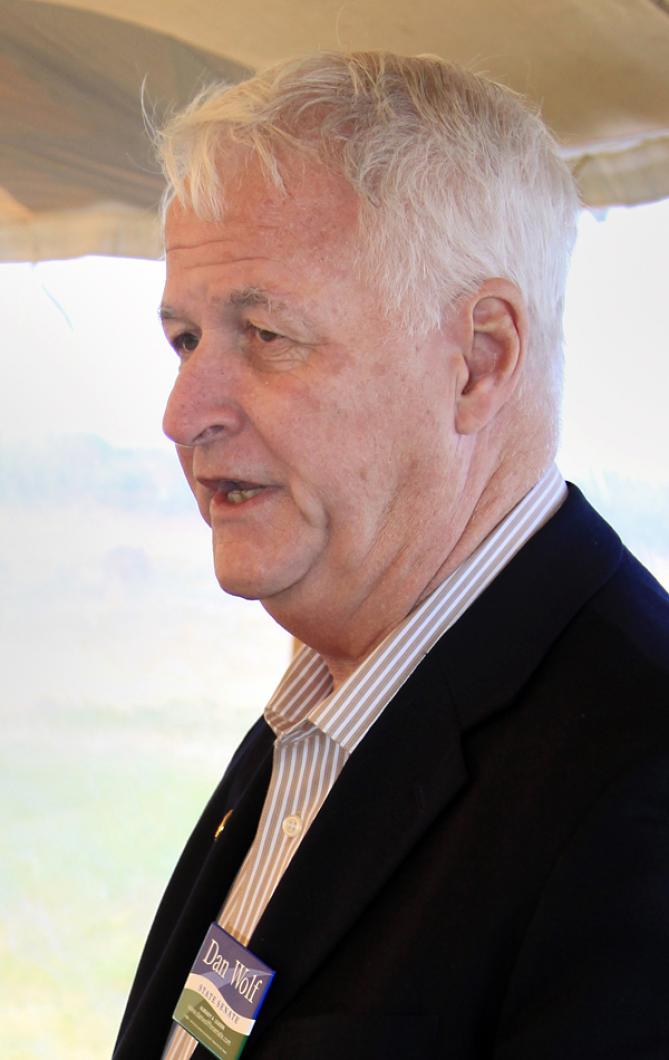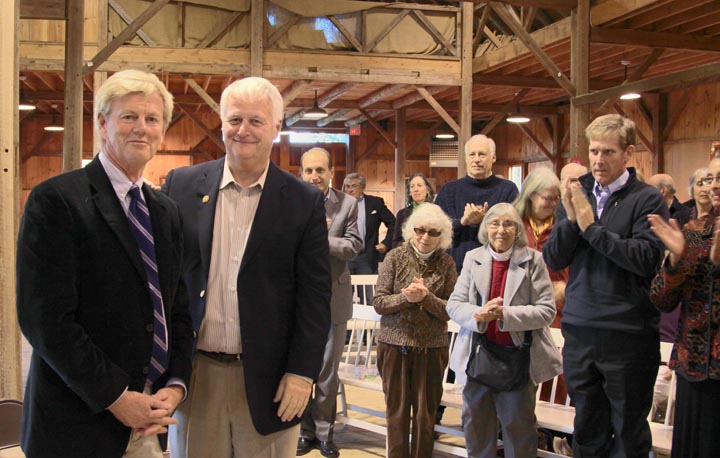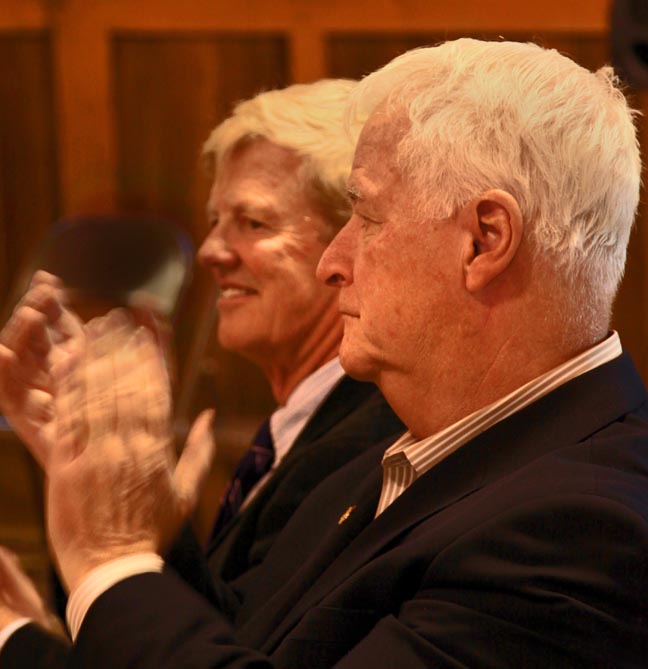The difference between a politician and a statesmen, someone once observed, is that a politician’s time horizon extends only as far as the next election.
So it was in statesman mode that Cong. William Delahunt arrived at the Gazette office last weekend, for perhaps a last editorial board discussion with the newspaper. He will not be a politician anymore after the election. But he will leave, unlike most of the Democrats who (the polls tell us) will be out after this election, at the time of his own choosing.
A statesman can be forthright about the state of public affairs in a way a politician cannot. For a start, he can shed the false optimism of the candidate and admit failures. Which Mr. Delahunt did, right at the start.
In political terms, he said, there was little good news for Democrats this election season. Frankly, he said the outlook was “bleak.”
“I think we have failed in terms of connecting the dots for the American people as to why they feel that their future is uncertain. I think what we had to do which we failed to do, was to remind the American public that when the president took over the helm of the ship of state, the ship was the Titanic.”
Thanks to the Obama administration, the ship was not sunk by the iceberg of economic crisis which loomed out of the dark two years ago, he said, although “we sure have a lot of scrapes on the side.”
He offered his predictions.
The bad news was that the Democrats would lose the House of Representatives, though probably not the Senate. Worse, the newly-elected Republicans would be there as the economy recovered, trying to take credit.
“And that really frosts me,” he said.
But ultimately, he thought, due credit would go to the Obama administration.
And those new Republicans, many of them out of right field, elected for their allegiance to the amorphous principles of the tea party movement, would cause trouble within their party, and between Republicans and the American electorate.
“I think the Republican party, the rational people within the Republican party, are going to be faced with a very difficult task, to bring the newly elected members . . . to support programs that mainstream America will feel positive about,” he said.
The views of many of those people, he believes, were “way outside” the mainstream of U.S. politics.
“We see people like that today within Congress, like Michele Bachmann or Stephen King. You’re going to see more of that type, more of those voices. And they are going to in many ways run up against the Republican leadership because the Republican leadership is going to say, we cannot govern this far out to the right.
“I feel very optimistic about the next two years in terms of the economy and I think that’s where it begins. I think the president as a result will be re-elected, that will be the good news [and] I think Democrats could very well be looking to regain the majority in the House,” he said.
But an improvement in the fortunes of the Democrats a couple of years down the track does not equate to recovery in the stocks of politicians in general.
While the anger of the moment would fade, the questions about the efficacy of government would remain until there was substantial change in the way the business of politics was practiced.
“There is a cynicism and skepticism about government, and it isn’t just in the past two years, it dates back really a decade,” said Mr. Delahunt.
A number of factors feed into this, he said. For one, the rise of partisan and deliberately distorting news media. The quality of journalism was eroding, the “filters” which once separated out the extreme and the plain untrue before presenting the news, were disappearing.
“So you’re operating in a world where there’s this raw anger out there, that translates into irrationality and you’re trying to believe the worst about everything and everyone. So if someone says that X is a pedophile, it’s out there. We’re looking for something to direct our anger towards. The blogs, I don’t even read them . . . they’ll say anything.”
And at the core of political dysfunction, he said, was how the whole political process is financed.
“It all goes back to money and the corrosive impact of money on the American political system.” He advocated public financing of campaigns.
“It’s the cheapest investment in the world because it will save American democracy, it really will,” he said.
Last year’s decision by the Supreme Court, which opened the door to vastly greater spending by corporations and unions, had greatly exacerbated the problem, he said.
“There’s no transparency today. If a business PAC gives, if Eli Lilly gives me $5,000, you know. If a union gives me $5,000, at least you know it. Now, these groups, we don’t know who they are, what their motives are, there’s no capacity to determine who’s funding them in a timely way. And they’re out there. It’s ‘Americans for whatever’ — some soothing name — and totally misrepresented. It sounds like a large organization but it’s created in a room like this with a couple of lawyers and one or two major people that have an opinion on a major issue. And it’s working.”
As for negative campaigning, one of the by-products of runaway election spending?
“I’m not going to comment on the campaigns; I don’t think it helps the quality of discourse,” he said, avoiding comment on the fact that the Democrat who hopes to replace him, William Keating, has run an unprecedented negative campaign for the 10th district.
But there was a noticeable difference between the way Mr. Delahunt talked about Mr. Keating and the way he talked about another of his party’s big hopes, state senate candidate Dan Wolf.
“I think Dan Wolf is going to be an extraordinary state senator, I think he is a wonderful human being. He’s a policy wonk and I’ll make a prediction. If he stays in the state senate, he will be in leadership in a relatively short period of time. He’s very principled but he’s a pragmatist as well. I think he’s going to win,” he said.
As for Mr. Keating: “Keating will grow. He will. His heart’s in the right place and you have to begin with your heart. And he’ll work at it. My counsel to him will be to do what I had to do in the aftermath of getting my head kicked in at the Democratic primary back in 1996 where I got 17 per cent of the vote. You have to come and live on the Vineyard, you have to live on Nantucket, and you got to be living on the Cape. And I’m sure he’ll follow that.”
On to personal matters, including his obvious relief at the prospect of giving up the Washington life.
“I live with two senators. Chuck Schumer and Dick Durban. And George Miller . . . New York magazine did a piece on Schumer, they called me, and the quote was: ‘Listen, don’t talk about hygiene because where we live we don’t have cockroaches because they’re afraid of the rats.’
“I wrestled the rats, and Schumer would jump on his bed and scream.”
And after politics, then what?
“Oh, hanging around the Gazette,” he joked, then turning serious. “I’ll be doing some government relations work. I’ve chaired Latin America and Europe on [the] oversight [committee]. I think the president is right, in this economy if we’re going to grow we’ve got to increase exports. You develop networks and relationships overseas. Helping American businesses penetrate these markets is absolutely critical.”
Asked for a final word, the statesman became momentarily a politician again.
“Vote for Deval Patrick, Bill Keating, Dan Wolf,” he said.
A smile, and then a more statesmanlike and heartfelt response:
“Let me just say it has been not only an honor or a pleasure, but a delight in representing the people on this Island. When I think of the 14 years, the memories that have accumulated have really been etched into my psyche and have enriched my life. And I shall return.”
Gazette reporters Remy Tumin and Peter Brannen contributed to this story.








Comments (2)
Comments
Comment policy »